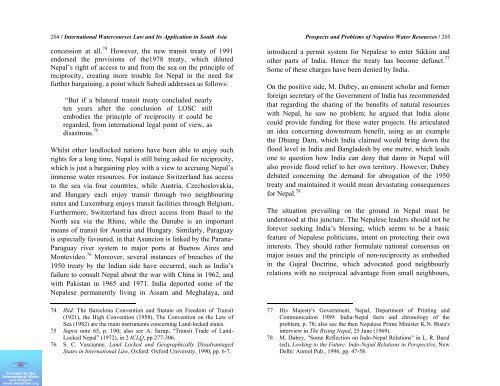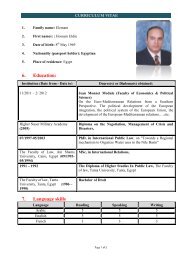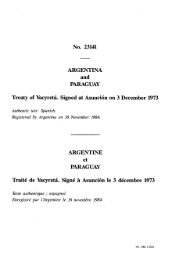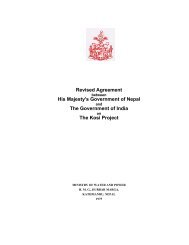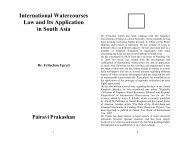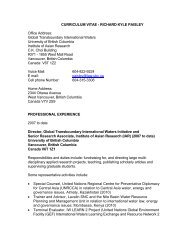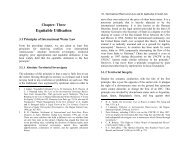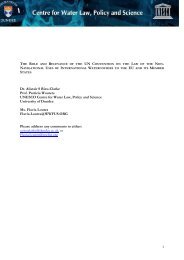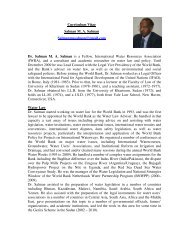Upreti, Trilochan, International Watercourses Law and Its Application ...
Upreti, Trilochan, International Watercourses Law and Its Application ...
Upreti, Trilochan, International Watercourses Law and Its Application ...
Create successful ePaper yourself
Turn your PDF publications into a flip-book with our unique Google optimized e-Paper software.
204 / <strong>International</strong> <strong>Watercourses</strong> <strong>Law</strong> <strong>and</strong> <strong>Its</strong> <strong>Application</strong> in South Asia Prospects <strong>and</strong> Problems of Nepalese Water Resources / 205concession at all. 74 However, the new transit treaty of 1991endorsed the provisions of the1978 treaty, which dilutedNepal’s right of access to <strong>and</strong> from the sea on the principle ofreciprocity, creating more trouble for Nepal in the need forfurther bargaining, a point which Subedi addresses as follows:“But if a bilateral transit treaty concluded nearlyten years after the conclusion of LOSC stillembodies the principle of reciprocity it could beregarded, from international legal point of view, asdisastrous. 75Whilst other l<strong>and</strong>locked nations have been able to enjoy suchrights for a long time, Nepal is still being asked for reciprocity,which is just a bargaining ploy with a view to accruing Nepal’simmense water resources. For instance Switzerl<strong>and</strong> has accessto the sea via four countries, while Austria, Czechoslovakia,<strong>and</strong> Hungary each enjoy transit through two neighbouringstates <strong>and</strong> Luxemburg enjoys transit facilities through Belgium.Furthermore, Switzerl<strong>and</strong> has direct access from Basel to theNorth sea via the Rhine, while the Danube is an importantmeans of transit for Austria <strong>and</strong> Hungary. Similarly, Paraguayis especially favoured, in that Asuncion is linked by the Parana-Paraguay river system to major ports at Buenos Aires <strong>and</strong>Montevideo. 76 Moreover, several instances of breaches of the1950 treaty by the Indian side have occurred, such as India’sfailure to consult Nepal about the war with China in 1962, <strong>and</strong>with Pakistan in 1965 <strong>and</strong> 1971. India deported some of theNepalese permanently living in Assam <strong>and</strong> Meghalaya, <strong>and</strong>74 Ibid. The Barcelona Convention <strong>and</strong> Statute on Freedom of Transit(1921), the High Convention (1958), The Convention on the <strong>Law</strong> ofSea (1982) are the main instruments concerning L<strong>and</strong>-locked states.75 Supra note 65, p. 190; also see A. Sarup, “Transit Trade of L<strong>and</strong>-Locked Nepal” (1972), in 2 ICLQ, pp 277-306.76 S. C. Vascianne, L<strong>and</strong> Locked <strong>and</strong> Geographically DisadvantagedStates in <strong>International</strong> <strong>Law</strong>, Oxford: Oxford University, 1990, pp. 6-7.introduced a permit system for Nepalese to enter Sikkim <strong>and</strong>other parts of India. Hence the treaty has become defunct. 77Some of these charges have been denied by India.On the positive side, M. Dubey, an eminent scholar <strong>and</strong> formerforeign secretary of the Government of India has recommendedthat regarding the sharing of the benefits of natural resourceswith Nepal, he saw no problem; he argued that India alonecould provide funding for these water projects. He articulatedan idea concerning downstream benefit, using as an examplethe Dhiang Dam, which India claimed would bring down theflood level in India <strong>and</strong> Bangladesh by one metre, which leadsone to question how India can deny that dams in Nepal willalso provide flood relief to her own territory. However, Dubeydebated concerning the dem<strong>and</strong> for abrogation of the 1950treaty <strong>and</strong> maintained it would mean devastating consequencesfor Nepal. 78The situation prevailing on the ground in Nepal must beunderstood at this juncture. The Nepalese leaders should not beforever seeking India’s blessing, which seems to be a basicfeature of Nepalese politicians, intent on protecting their owninterests. They should rather formulate national consensus onmajor issues <strong>and</strong> the principle of non-reciprocity as embodiedin the Gujral Doctrine, which advocated good neighbourlyrelations with no reciprocal advantage from small neighbours,77 His Majesty's Government, Nepal, Department of Printing <strong>and</strong>Communication 1989: India-Nepal facts <strong>and</strong> chronology of theproblem, p. 78; also see the then Nepalese Prime Minister K.N. Bista'sinterview in The Rising Nepal, 25 June (1969).78 M. Dubey, "Some Reflection on Indo-Nepal Relations" in L. R. Baral(ed), Looking to the Future: Indo-Nepal Relations in Perspective, NewDelhi: Anmol Pub., 1996, pp. 47-58.


